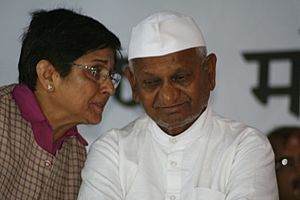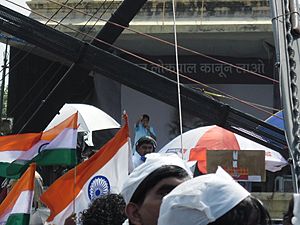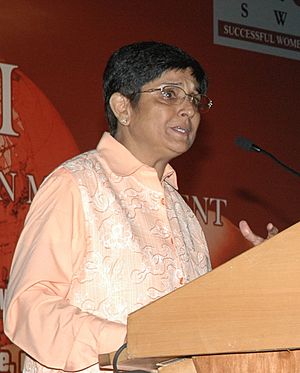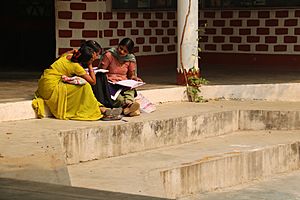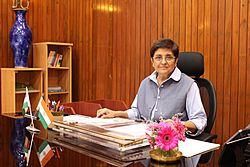Kiran Bedi facts for kids
Quick facts for kids
Kiran Bedi
PPMG PNBB
|
|
|---|---|
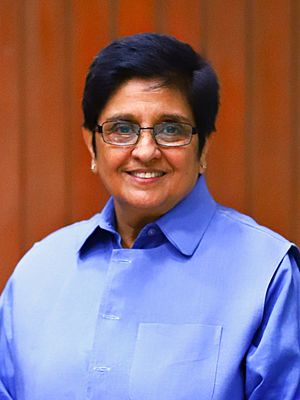 |
|
| 24th Lieutenant Governor of Pondicherry | |
| In office 28 May 2016 – 16 February 2021 |
|
| Chief Minister | V. Narayanasamy |
| Preceded by | A. K. Singh |
| Succeeded by | Tamilisai Soundararajan (additional charge) |
| Director General of Bureau of Police Research and Development | |
| In office 2005–2007 |
|
| Police Adviser and Director of United Nations Police | |
| In office 2003–2005 |
|
| Personal details | |
| Born |
Kiran Peshawaria
9 June 1949 Amritsar, East Punjab, India |
| Citizenship | Indian |
| Political party | Bharatiya Janata Party |
| Other political affiliations |
National Democratic Alliance |
| Spouse |
Brij Bedi
(m. 1972; died 2016) |
| Children | 1 |
| Parents |
|
| Relatives | Anu Peshawaria (Sister), Tek Chandra Arora |
| Residence | New Delhi |
| Education | Sacred Heart Convent School Cambridge College |
| Alma mater | S.R. Govt. College (BA Hons.) (MA) Delhi University (LL.B.) IIT Delhi (Ph.D.) |
| Awards |
|
Kiran Bedi (born 9 June 1949) is a famous Indian social activist and politician. Before this, she was a talented tennis player and a police officer. In 1972, she became the first woman to join the officer ranks of the Indian Police Service (IPS). She served for 35 years before retiring in 2007.
As a teenager, Bedi was India's national junior tennis champion. After joining the police, she served in many places, including Delhi, Goa, and Mizoram. She won the President's Police Medal in 1979 for her bravery. She was known for making communities safer, especially for women.
In 1993, Bedi was put in charge of Delhi's Tihar Jail. She introduced many positive changes, turning it into a model prison. Her work earned her the Ramon Magsaysay Award in 1994, which is a very high honor in Asia. In 2003, she became the first Indian woman to be appointed as a Police Advisor to the United Nations.
After retiring from the police, she became a social activist. She hosted a popular TV show called Aap Ki Kachehri and was a key leader in the 2011 Indian anti-corruption movement. In 2015, she joined the Bharatiya Janata Party (BJP). From 2016 to 2021, she served as the Lieutenant Governor of Puducherry.
Contents
Early Life and Education
Kiran Peshawaria was born on 9 June 1949 in Amritsar, India, to a business family. She is the second of four daughters. Her parents, Prakash Lal and Prem Lata Peshawaria, believed in giving their daughters the best education possible.
Bedi started school in 1954 at the Sacred Heart Convent School. She was active in the National Cadet Corps (NCC) and other activities. She later went to Cambridge College to study science. In 1968, she earned a Bachelor of Arts degree in English. In 1970, she got a Master's degree in Political Science from Panjab University.
Even while working as a police officer, she continued her studies. She earned a law degree from Delhi University in 1988. In 1993, she received a Ph.D. from the IIT Delhi.
Tennis Career
Inspired by her father, who also played tennis, Bedi started playing when she was nine. She became a very successful player. Between 1965 and 1978, she won many championships.
| Title | Year | Place | Notes / Source |
|---|---|---|---|
| Junior National Lawn Tennis Championship | 1966 | Amritsar | |
| All-India Intervarsity Tennis Title | 1968 | Vishakhapatnam | With her younger sister Reeta. The pair won the championship three years in a row. |
| Northern India Lawn Tennis Championship | 1970 | Chandigarh | |
| Asian Lawn Tennis Championship | 1972 | Pune | |
| All-India Hard Court Tennis Championship | 1974 | ||
| All India Interstate Women's Lawn Tennis Championship | 1975 | New Delhi | |
| National Women's Lawn Tennis Championship | 1976 | Chandigarh | |
| Gold medal, National Sports Festival for Women | 1976 | New Delhi | With her sister Anu |
She also played for the Indian team that won a trophy in Sri Lanka. She married a fellow tennis player, Brij Bedi, in 1972.
Indian Police Service Career
Inspired by senior government officers she met, Kiran Bedi decided to pursue a career in public service. On 16 July 1972, she began her police training. She was the only woman in a class of 80 men and became the first woman IPS officer in India.
First Posting in Delhi
Bedi's first job as a police officer was in the Chandni Chowk area of Delhi in 1975. That same year, she led an all-male police group in the Republic Day Parade, another first for a woman.
In 1979, she was posted to West Delhi, an area with a high crime rate. She started recruiting civilian volunteers to help patrol at night. She also created an "open door" policy, encouraging people to talk to her directly about their problems. These efforts helped reduce crime and made the area safer for women.
Crane Bedi
In 1981, Bedi was put in charge of traffic police in Delhi. The city was preparing for the 1982 Asian Games, which caused major traffic jams. Bedi's team worked hard to manage the traffic. They used tow trucks, or "cranes," to move improperly parked cars. This earned her the nickname "Crane Bedi." She was known for being fair and strict, even giving a ticket to a car from the Prime Minister's Office.
Goa and North Delhi
In 1983, Bedi was transferred to Goa. There, she helped manage traffic for the Commonwealth Heads of Government Meet.
In 1986, she returned to Delhi as the Deputy Commissioner of Police for the North District. She started a campaign to help people with harmful habits. She set up centers that provided treatment and support. These centers were so successful that they grew into a large organization called the Navjyoti India Foundation, which still helps people today.
A Major Disagreement
In 1988, a major disagreement happened between the police and lawyers in Delhi. It started when a lawyer was arrested. Many other lawyers went on strike to protest, and the situation became very tense. An investigation was held, and the judges recommended that Bedi and four other officers be transferred. She was then moved to the Narcotics Control Bureau.
Time in Mizoram
In 1990, Bedi chose to be transferred to Mizoram, a remote state in Northeast India. While there, she worked on her Ph.D. thesis. However, she had to leave her post in 1992 after a controversy arose over a college admission for her daughter.
Reforming Tihar Jail
In May 1993, Bedi was made the Inspector General of Delhi's Tihar Jail. At the time, Tihar was known for being overcrowded and difficult to manage. Bedi decided to turn it into a model prison.
She introduced many positive changes:
- Education and Skills: She set up vocational training programs so prisoners could learn skills to find jobs after their release. She also started prison branches of the Indira Gandhi National Open University and the National Open School.
- Health and Wellness: She banned smoking and introduced yoga and meditation classes to help prisoners.
- Better Management: She created a system where respected prisoners could represent others and help solve problems. She also set up "petition boxes" so inmates could write to her directly with their concerns.
Bedi's reforms were praised all over the world. However, her new methods caused disagreements with some of her superiors. In 1995, she was transferred from Tihar. Many prisoners protested her transfer.
Later Career and Retirement
After Tihar, Bedi held several other important positions. She served as a Joint Commissioner and Special Commissioner of the Delhi Police. In 2003, she became the first woman to be appointed as the United Nations Civilian Police Advisor.
In 2007, Bedi resigned from the police service to focus on social and academic work.
Social Activism
Kiran Bedi has been a dedicated social activist for many years. Her foundations, Navjyoti India Foundation and India Vision Foundation, have helped thousands of people.
- Navjyoti India Foundation: Started in 1987, this foundation helps educate children from poor families. It runs schools, vocational training centers, and health clinics.
- India Vision Foundation (IVF): Founded in 1994, IVF works on police and prison reforms, women's empowerment, and community development.
From 2008 to 2011, Bedi hosted a TV court show called Aap Ki Kachehri, where she helped people solve everyday problems.
In 2011, she became a key leader of the India Against Corruption movement, along with Anna Hazare and Arvind Kejriwal. They pushed for a stronger anti-corruption law in India.
Political Career
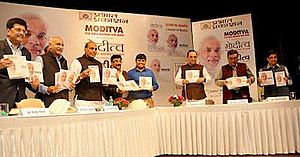
In 2014, Kiran Bedi supported Narendra Modi in the general election. In January 2015, she joined the Bharatiya Janata Party (BJP). She was the party's candidate for Chief Minister in the 2015 Delhi Assembly election, but she did not win.
Lieutenant Governor of Puducherry
On 29 May 2016, Bedi was appointed the Lieutenant Governor of Puducherry. She made the official governor's residence, Raj Nivas, open to the public. She started an "open house" where people could meet her to discuss their problems.
She was known for taking morning bicycle rides to check on public services and talk to people. She also started important projects like ‘Mission Water Rich Puducherry’ to clean water channels and ‘Mission Green Puducherry’ to plant trees. She served in this role until 16 February 2021.
Author
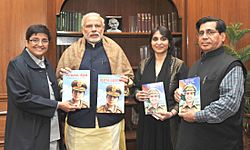
Kiran Bedi has written several books about her experiences and ideas on leadership, governance, and social issues. Some of her books include I Dare!, It's Always Possible, and Creating Leadership.
Personal Life
Kiran Bedi married Brij Bedi in 1972. They had one daughter, Saina. Brij Bedi supported his wife's career throughout their lives. He passed away in 2016.
Awards and Recognitions
Kiran Bedi has received many awards for her work in policing, prison reform, and social service.
| Year | Award | By | For |
|---|---|---|---|
| 1979 | President's Police Medal for Gallantry | President of India | Conspicuous courage in preventing violence |
| 1994 | Ramon Magsaysay Award | Ramon Magsaysay Award Foundation | Government service |
| 1997 | Joseph Beuys Prize | Joseph Beuys Foundation, Germany | Holistic and Innovative Management (Prison reform) |
| 1999–2000 | IIT Delhi Alumni Award | Indian Institute of Technology – Delhi Alumni Association | Outstanding Contribution to National Development |
| 2004 | United Nations Medal | United Nations | Outstanding service |
| 2005 | Mother Teresa Memorial National Award for Social Justice | All India Christian Council | Reforms in prison and penal systems |
| 2013 | Nomura Award | Nomura Group | Humanitarian work |
| 2014 | L’Oreal Paris Femina Women Award | L'Oréal and Femina | Social impact |
Images for kids
-
Bedi leading a cycle rally at Karaikal.
See also
 In Spanish: Kiran Bedi para niños
In Spanish: Kiran Bedi para niños
 | Janet Taylor Pickett |
 | Synthia Saint James |
 | Howardena Pindell |
 | Faith Ringgold |


